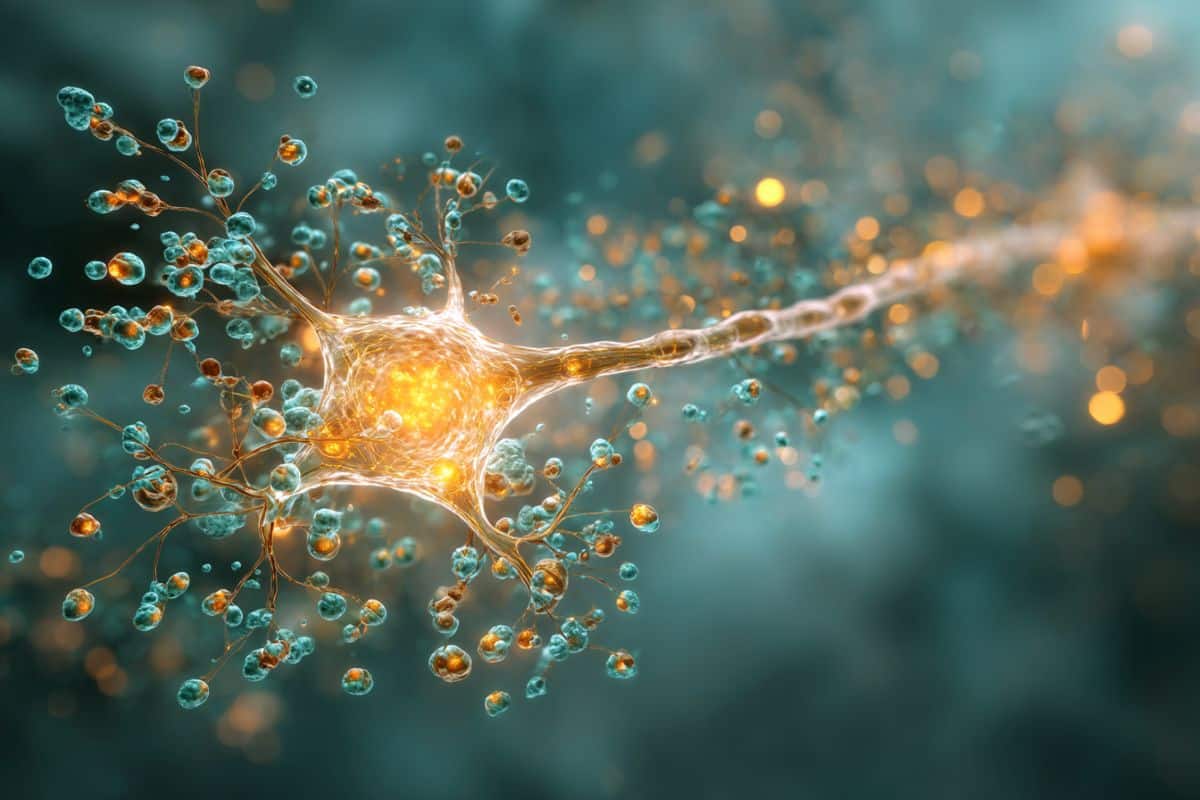Summary: Scientists have shown that neurons don’t rely solely on sugar for energy — they can also burn fat. When energy demand spikes, neurons even create their own fats by recycling parts of themselves, a process dependent on a key protein called DDHD2.
In Hereditary Spastic Paraplegia 54 (HSP54), DDHD2 malfunctions, cutting off this energy source and impairing neuron function. Remarkably, researchers found that providing neurons with special fatty acids restored their energy production and activity within just 48 hours, offering new hope for treating neurodegenerative diseases.
Key Facts:
- Fat-Fueled Neurons: Neurons can generate and burn their own fats for energy, overturning decades of neuroscience dogma.
- Protein DDHD2: Essential for neuron lipid metabolism; its dysfunction causes severe movement and cognitive decline in HSP54.
- Therapeutic Breakthrough: Fatty acid supplements restored function in damaged neurons, pointing to a potential treatment path.
Source: University of Helsinki
Scientists from the University of Queensland (Australia) and the University of Helsinki (Finland) have found that, contrary to what was long believed, neurons don’t just rely on sugar for energy—they can burn fat too.
Even more fascinating, when energy demands are high, neurons create their own fats by recycling their own cell parts. A key protein called DDHD2 makes this possible.

The discovery that can change patients’ lives
In a brain condition called Hereditary Spastic Paraplegia 54 (HSP54), the DDHD2 protein doesn’t work properly. Without it, neurons can’t make fats for energy and to support their functions, leading to early and worsening problems with firing off their signals.
Already at a young age, HSP54 patients display progressive defects in moving and thinking. But this discovery brings hope: by giving damaged neurons grown in the laboratory special fatty acid supplements, researchers were able to restore their energy production and function, in just 48 hours.
“This is a real game-changer,” said Dr Merja Joensuu, who conceived the project and led the study at the Australian Institute for Bioengineering and Nanotechnology.
“We’ve shown that healthy neurons rely on fats for fuel, and when this pathway fails in conditions like HSP54, it may be possible to repair the damage and reverse the neuropathologies.”
New technologies give hope
The team is now moving to the next stage: testing whether these fatty acid-based therapies are safe and effective in pre-clinical models, a necessary step before clinical trials in humans, and whether this fat-fueled brain pathway could help treat other, previously untreatable, brain diseases.
“We will continue the exciting collaboration with new non-invasive technologies to image the brain and therefore aid a faster development of the potential therapy. This breakthrough doesn’t just rewrite the textbooks, it could transform lives” Dr Giuseppe Balistreri from the University of Helsinki says.
Key Questions Answered:
A: They found that neurons can burn fat for fuel, not just sugar, and can even produce their own fats during high energy demand.
A: DDHD2 enables neurons to recycle cellular components to create fats for energy; without it, energy production fails, leading to neurodegeneration.
A: By restoring fat metabolism with fatty acid therapies, scientists may be able to reverse neuron damage in conditions like HSP54 and possibly other brain diseases.
About this neuroscience, neurology, and metabolism research news
Author: Pia Purra
Source: University of Helsinki
Contact: Pia Purra – University of Helsinki
Image: The image is credited to Neuroscience News
Original Research: Open access.
“DDHD2 provides a flux of saturated fatty acids for neuronal energy and function” by Giuseppe Balistreri. Nature Metabolism
Abstract
DDHD2 provides a flux of saturated fatty acids for neuronal energy and function
Although fatty acids support mitochondrial ATP production in most tissues, neurons are believed to rely exclusively on glucose for energy.
Here we show that genetic ablation of the triglyceride and phospholipid lipase Ddhd2 impairs mitochondrial respiration and ATP synthesis in cultured neurons, despite increased glycolysis.
This defect arises from reduced levels of long-chain saturated free fatty acids, particularly myristic, palmitic and stearic acids, normally released in an activity-dependent manner by Ddhd2.
Inhibition of mitochondrial fatty acid import in wild-type neurons similarly reduced mitochondrial respiration and ATP production. Saturated fatty acyl-coenzyme A treatment restored mitochondrial energy production in Ddhd2 knockout neurons.
When provided in combination, these activated fatty acyl-CoA supplements also rescued defects in membrane trafficking, synaptic function and protein homeostasis.
These findings uncover that neurons perform β-oxidation of endogenous long-chain free fatty acids to meet ATP demands and reveal a potential therapeutic strategy for hereditary spastic paraplegia 54 caused by DDHD2 mutations.
Source link


